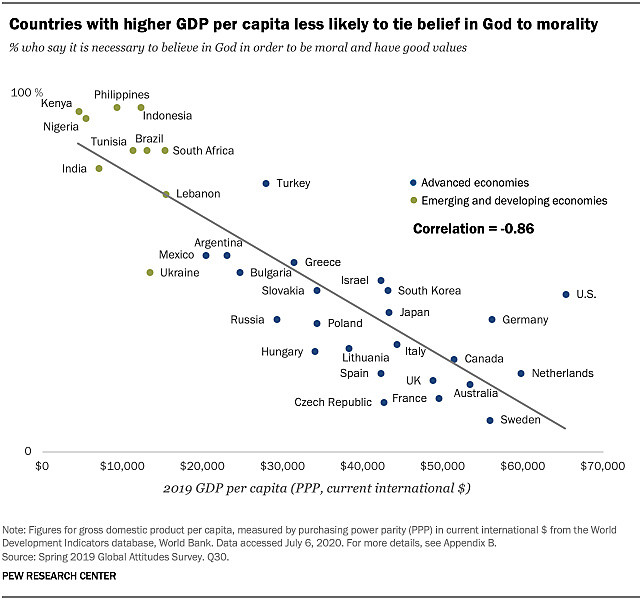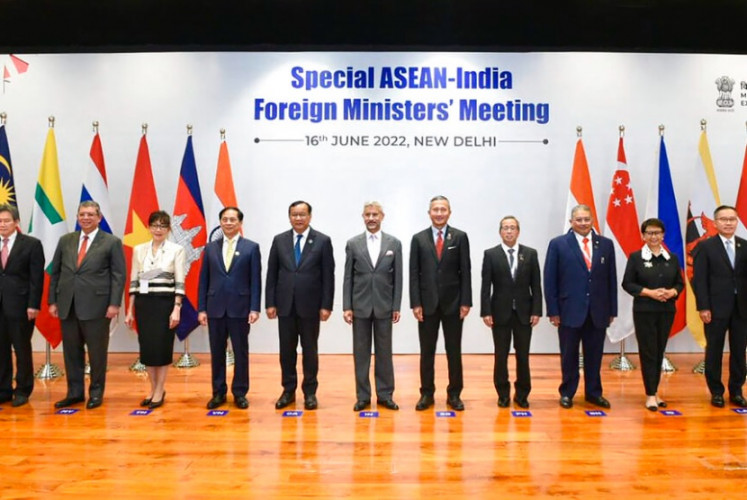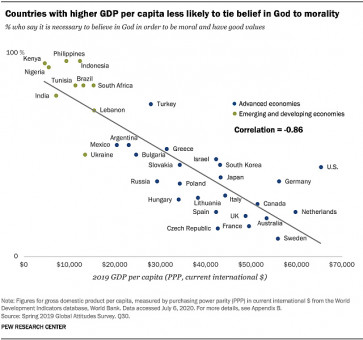Would a more secular Indonesia be wealthier?
While a Pew survey has established a correlation between religiosity and the prosperity of a nation, it does not indicate if or how one variable has a bearing on the other.
Change Size
 Differences in views on belief in God and morality by GDP per capita (Spring Global Attitude Survey/Pew Research Center)
Differences in views on belief in God and morality by GDP per capita (Spring Global Attitude Survey/Pew Research Center)
T
hat Indonesians possess strong religiosity is a well-established fact. A first-time visitor to the country would be amazed at how much Indonesians build their lives around their faith, observing the teachings and practicing the rituals of whatever religion they follow.
But is this religiosity getting in the way of the world’s fourth most populous country becoming more prosperous? Was Karl Marx right in his dictum that “religion is the opium of the people”, and that most Indonesians put the spiritual ahead of the material world?
An international survey found a strong inverse correlation between religiosity and the wealth of nations, with the inevitable conclusion that the more religious nations tended to have lower per capita gross domestic product (GDP), while the more secular countries tended to be wealthier.
In a Pew Research Center survey of 34 developed and emerging economies conducted last year, Indonesia topped the list for positive responses to the question, “Is it necessary to believe in God in order to be moral and have good values?” A staggering 96 percent of Indonesian respondents replied yes.
This apparently has little to do with Islam, the professed faith of 88 percent of the country’s 270 million population. Indonesia shares the top spot with its neighbor the Philippines, a predominantly Catholic nation. Is this something to do with living in an archipelagic nation or areas prone to natural disasters like volcanic eruptions, earthquakes, tsunamis, typhoons, floods and landslides?
Other countries that ranked high in positive responses to the above question include Kenya with 95 percent, Nigeria with 93 percent, Brazil, South Africa and Tunisia all with 84 percent, and India with 79 percent. The people in these countries also connect belief in God with good moral conduct and values.
At the other end of the extreme are secular countries where a minority of the population link faith and morality. In Sweden, only 9 percent of respondents held this view, followed by the Czech Republic and France with 14 and 15 percent, respectively. The culture wars in the United Sates have slowed secularization, with 44 percent of Americans still believing there was a link between faith and morality. Closer to Indonesia, 19 percent of Australian respondents held this view, followed by 39 percent of Japanese respondents and 45 percent of South Korean respondents.
















